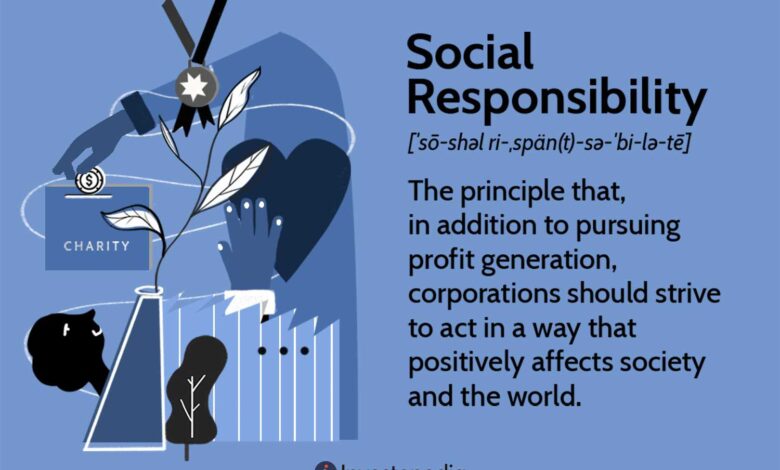How to Become a Socially Responsible Company

Table of Contents
Introduction
In the modern business world, profitability alone is no longer enough. Today’s consumers, employees, and investors expect companies to act responsibly toward society and the environment. Socially responsible companies are those that combine business success with ethical practices, sustainability, and community impact. They focus not just on what they produce, but how they produce it, and what broader value they bring to people and the planet.
This article explores what it means to be a socially responsible company, why it matters, the benefits, practical steps to get started, challenges to be aware of, and real-world examples. Whether you run a startup, a small business, or a multinational corporation, becoming more socially responsible is one of the best long-term strategies for success.
What Is a Socially Responsible Company?
A socially responsible company integrates ethical, environmental, and social values into every part of its operations. Instead of focusing solely on profit, it balances four key responsibilities:
- Economic responsibility – making profit sustainably and fairly.
- Legal responsibility – following laws and regulations honestly.
- Ethical responsibility – doing what is right, even beyond legal requirements.
- Philanthropic responsibility – giving back to communities through charity, education, or social causes.
This holistic approach ensures that the company not only thrives financially but also creates a positive impact for society and the environment.
Why Social Responsibility Matters
- Builds trust and reputation
Companies that act responsibly earn the respect of customers, employees, and the wider community. Trust builds loyalty, which leads to repeat business and long-term brand strength. - Attracts and retains talent
Employees increasingly prefer to work for companies that reflect their values. Social responsibility initiatives improve morale, engagement, and retention. - Improves risk management
By addressing social and environmental risks early, companies avoid scandals, penalties, and public backlash. - Drives innovation
Pursuing sustainability often leads to creative problem-solving and new product ideas, such as eco-friendly packaging or ethical sourcing. - Appeals to investors
Investors today prioritize ESG (Environmental, Social, Governance) performance. Responsible companies are more likely to secure funding and favorable investment opportunities. - Creates positive impact
Beyond business, companies can tackle social inequality, reduce carbon emissions, or support local communities—making the world a better place.
How to Become a Socially Responsible Company
Here is a practical, step-by-step framework any business can follow:
1. Define Core Values and Purpose
Decide what your company stands for beyond profit. Are you passionate about sustainability? Education? Diversity? Your purpose should connect with your mission and resonate with customers and employees.
2. Engage Stakeholders
Talk to employees, customers, suppliers, and community members. Find out what issues matter most to them. This makes your strategy inclusive and ensures people feel part of the journey.
3. Set Measurable Goals
Vague promises don’t work. Define specific targets such as:
- Reducing carbon footprint by 30% in five years.
- Achieving gender equality in leadership roles.
- Donating 2% of annual profits to community programs.
Clear goals make progress measurable and credible.
4. Integrate Responsibility Into Operations
Social responsibility should not be a side project; it must be embedded in daily business practices. Examples include:
- Choosing eco-friendly materials.
- Ensuring fair wages and safe working conditions across the supply chain.
- Reducing energy use and waste in production.
- Partnering with ethical suppliers.
5. Empower and Educate Employees
Employees are the heart of CSR. Offer training, create volunteering programs, and encourage them to contribute ideas. When staff feel connected to the mission, they become powerful advocates for the company’s values.
6. Be Transparent
Share both successes and challenges openly. Annual sustainability reports, social impact updates, or even blog posts help build credibility. Avoid exaggerating—authenticity matters more than perfection.
7. Innovate and Adapt
Social and environmental challenges evolve. Review your CSR strategy regularly and adapt to new realities, technologies, and community needs. Companies that stay flexible are more resilient and impactful.
Real-World Examples
- LEGO: Invests heavily in sustainable materials and renewable energy to reduce environmental impact.
- Salesforce: Donates 1% of equity, 1% of products, and 1% of employee time to philanthropic causes.
- Ben & Jerry’s: Advocates for climate action, social justice, and fair trade while staying true to its brand identity.
- Patagonia: Donates 1% of sales to environmental causes and encourages conscious consumerism.
These companies show that social responsibility can align perfectly with brand identity while driving long-term growth.
Common Challenges and Solutions
- High Costs
Sustainable materials and ethical sourcing may cost more.
Solution: Start small, scale gradually, and highlight long-term savings from efficiency and brand trust. - Greenwashing Concerns
Companies risk being accused of making empty promises.
Solution: Provide proof, publish data, and use third-party audits when possible. - Balancing Profit and Purpose
Short-term pressures may compete with social goals.
Solution: Integrate responsibility into core strategy so it contributes to financial success rather than competing with it. - Stakeholder Misalignment
Different groups may want different things.
Solution: Communicate clearly, manage expectations, and focus on shared values.
EEAT: Building Credibility in Social Responsibility
To earn real trust, companies need to demonstrate:
- Experience: Share case studies, stories, and past results.
- Expertise: Work with specialists in sustainability, ethics, or social programs.
- Authoritativeness: Align with recognized standards like ISO 26000, ESG frameworks, or industry certifications.
- Trustworthiness: Be transparent, admit challenges, and avoid misleading claims.
By following these principles, companies can stand out as truly responsible rather than performative.
Read More: Digital Marketing in 2025: Strategies
Conclusion
Social responsibility is more than a corporate trend—it’s a necessity for long-term success. Companies that take responsibility for their impact on people and the planet earn trust, attract talent, manage risks better, and build stronger brands.
The path to becoming socially responsible starts with defining core values, listening to stakeholders, setting measurable goals, and embedding ethics into daily operations. It continues with empowering employees, maintaining transparency, and adapting to new challenges.
The journey is not always easy, but the rewards are immense: a loyal customer base, inspired employees, supportive investors, and a lasting positive impact on society. In today’s world, the most successful companies will be those that prove profit and purpose can go hand in hand.
FAQs
1. What does it mean for a company to be socially responsible?
It means operating in a way that balances profit with positive contributions to society and the environment. This includes ethical practices, sustainability, and community engagement.
2. How can small businesses practice social responsibility?
Small businesses can start by reducing waste, supporting local charities, choosing ethical suppliers, and treating employees fairly. Even small efforts make a big impact.
3. Why is social responsibility important for businesses?
It builds trust, attracts employees and investors, improves risk management, and creates long-term value while also making a positive difference in society.
4. What are examples of socially responsible companies?
Examples include Patagonia, Ben & Jerry’s, LEGO, and Salesforce, which integrate sustainability, ethical practices, and philanthropy into their operations.
5. What mistakes should companies avoid in CSR?
Common mistakes include vague promises without measurable goals, greenwashing, neglecting supply chain issues, and failing to align CSR with core business values.



